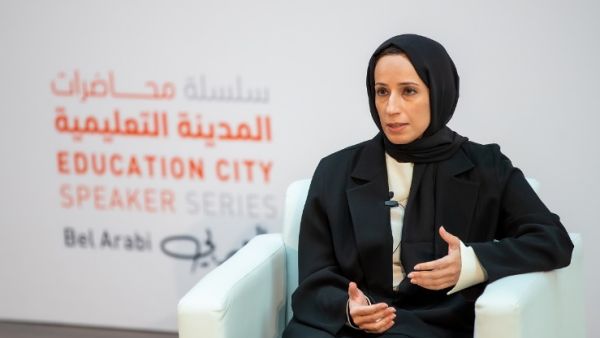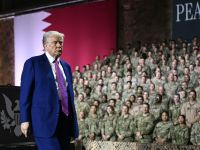We Must Protect Our Youth’s National Identity, Minister of Education and Higher Education Tells QF Talk

The importance of protecting the national identity of Qatar’s young people from “cultural dissolution” in the information age, and equipping its students with 21st Century skills, has been emphasized by Her Excellency Buthaina bint Ali Al Jabr Al Nuaimi, Minister of Education and Higher Education, at Qatar Foundation’s Education City Speaker Series Bel Arabi.
During the event at Qatar National Library – held in collaboration with the Ministry of Education and Higher Education – Her Excellency Al Nuaimi spoke about how Qatar’s e-learning strategy aims to elevate students’ digital skills and “stimulate their curiosity in modern methods of learning”, and the process of shaping the nation’s education roadmap for the next eight years.
She also announced the My Skills, My Future initiative, which is currently in its planning stage, and is aimed at supporting students to develop their future skills – such as technological and communication skills – through curricula and education camps, enabling them to meet the challenges of the labor market. It is one of 13 initiatives as part of the Ministry’s strategic plan for education, four of which were unveiled this week.
And Her Excellency Al Nuaimi told the audience: “Education is a great responsibility that rests on everyone’s shoulders – let’s work together to keep the torch of learning glowing and make Qatar a beacon of science, knowledge, and peace in the world.”
The discussion – which took place in the Arabic language – saw Her Excellency Al Nuaimi say: “It is imperative for us to have policies and frameworks in place to protect our young people and their national identity from cultural dissolution amid the unprecedented flow of information that comes to them across all communication channels.
“Our national and local identity and our culture – inspired by our religion, our customs and traditions, and our Arabic language – is the foundation of this. It is at the core of building the Qatari personality, which is rooted in our values while at the same time being open to the world.”
Her Excellency Al Nuaimi told the event that educating children and young people “is no longer confined to sciences, or gaining knowledge”, saying: “Human skills are very important in dealing with the challenges of life.
“That is why we have focused on developing our students’ 21st Century skills, encouraging them to think in a critical way which will help them transition smoothly to higher education, and then to be competitive in the regional and international labor market while being aware of the needs of this market.”
She told the audience how Qatar’s strategic direction for education places students at its core “so they can seek lifelong learning provided by education, flexibility, curiosity, passion, and creativity”, with a focus on teachers as “role models” who “inspire and empower themselves to achieve excellence”. She explained how the views of both students and teachers had been sought in shaping Qatar’s e-learning strategy, and described schools as being “a student’s second home, and they need to feel they belong there in order to grow”.
The COVID-19 pandemic, Her Excellency Al Nuaimi said, has cemented a “global belief in the need to reimagine education systems, today and tomorrow”, as she said: “Transformation in education is now a reality, and we need to adopt the idea of reimagining education and develop new visions, perceptions, and directions.”
Ahead of the Transforming Education Summit at the United Nations in New York this month, Qatar has been at the forefront of discussions with education leaders in the Middle East and Asia on addressing the main topics surrounding reimagining education. Her Excellency Al Nuaimi said that talks between education stakeholders in Qatar, along with UNESCO and UNICEF, have identified nurturing national and cultural identity, and the Arabic language; digital transformation in education; support for teachers to enhance the quality of education; and developing future skills through higher education as key topics.
“Education is a humanitarian and social process,” she said. “Its primary goal is to nurture active and good human beings who believe in their role in building their society and their nation, and in contributing to spreading goodness, justice, and beauty in this world.”
Reflecting Qatar Foundation’s commitment to accessibility and inclusivity, the Education City Speaker Series Bel Arabi event with Her Excellency Al Nuaimi was held with Arabic sign language being available.
Background Information
Qatar Foundation
Qatar Foundation (QF) is a non-profit organization made up of more than 50 entities working in education, research, and community development.
Our unique ecosystem—supported by partnerships with leading international institutions—is built on initiatives that address our most pressing challenges, create global opportunities, and empower people to shape our present and future.






